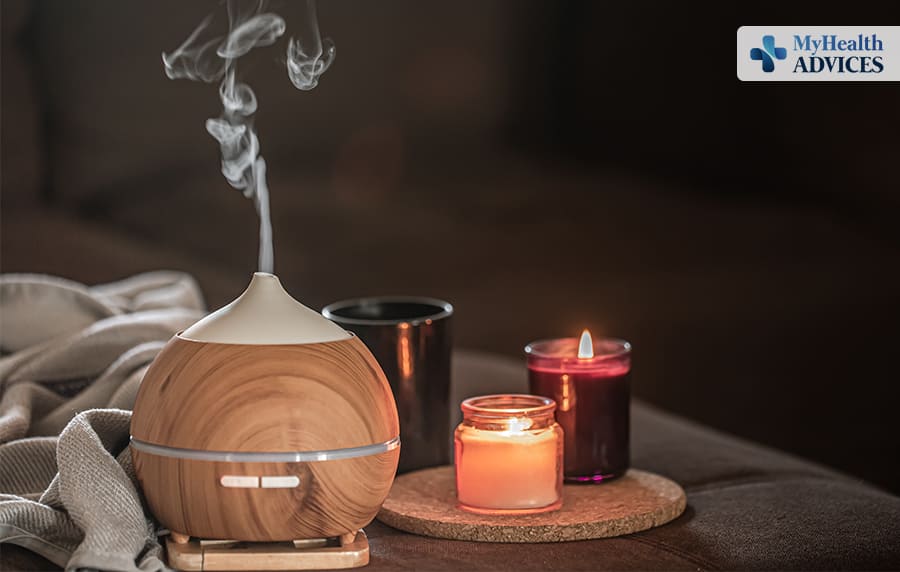Aromatherapy is something that has been used since time immemorial. These essential oils travel from olfactory nerves and then directly to the brain’s amygdala which is the emotional center of the brain. These oils have medicinal properties and pose numerous health benefits.
In this article, I will be discussing the uses, benefits, and risks that are associated with Aromatherapy. Keep reading till the end to find out more information about the same!
About Aromatherapy
Aromatherapy refers to the healing treatment that makes use of natural plant extracts that promote the well-being and health of a person. Sometimes, it is also called essential oil therapy.
Aromatherapy makes use of aromatic (scent-infused) essential oils which have medicinal properties and are known to improve the mind, spirit, and health of a body. This enhances both the emotional and physical health of a person.
Examples Of Popular Aromatherapy Oils
According to the NAHA (National Association for Holistic Aromatherapy), some of the most popular aromatherapy oils are -cypress, fennel, lavender, eucalyptus, mandarin, patchouli, rosemary, helichrysum, rose, clary sage, neroli, ylang ylang, geranium, lemongrass, lemon, Roman chamomile, vetiver, tea tree, lemon, ginger, peppermint.
Uses Of Different Aromatherapy Oils
Here is a list of the following uses of some of the Aromatherapy oils and the health benefits they pose for people:
1. Lavender Oil
This oil is gentle and has a lot of benefits. It can also be used in a variety of ways. You can try adding in a diffuser or a bath and use it for aromatherapy.
This oil can also be mixed with a base oil to make it into a body oil. Lavender is also additionally known to help with pain and sleep. It effectively works in reducing levels of stress as well.
2. Tea Tree Oil
Majority of the people make use of tea tree oil as an antiseptic, antifungal, or antimicrobial. They can even be used to treat – ringworms or athlete’s feet and even acne.
A tip would be not to diffuse tea tree oil at home if you have pets or small children at home – as they are highly neurotoxic.
3. Lemon Oil
Lemon oil is extracted from the peels of lemons and this oil can be diffused and even applied topically on the skin with the aid of a carrier oil of course. This type of oil is known to ease nausea, reduce depression and anxiety, reduce pain, and kill bacteria.
There have also been studies that stated that aromatherapy of oils like this might actively help in improving the cognitive ability of people who have Alzheimer’s disease.
4. Bergamot Oil
This oil has a very floral and fruity aroma. It can be applied topically and diffused in the air. When applying this oil topically to your skin you need to make sure that your skin is being protected from exposure as this oil makes the skin very sensitive to the sun.
The Bergamot oil is also known to – lift mood, reduce anxiety, and even lower blood pressure.
5. Frankincense Oil
This oil is referred to as the king of oils. It helps with sleep, mood, and inflammation. There have been numerous studies that have shown that this oil is positively linked to the prevention of gum disease and improving asthma.
This oil also has a spicy and woody type of scent that might be used as an oil, often mixed in skin creams.
Benefits Of This Form Of Therapy
Aromatherapy is known to provide a wide range of benefits. A few of them are:
- An effective form of aromatherapy treatment is known to help in managing pain.
- It also actively helps in improving the quality of sleep.
- It essentially reduces agitation, anxiety, and stress.
- If a person has any condition of sore joints then aromatherapy would also aid in relieving that.
- It treats migraines and headaches as well.
- It alleviates the posed side effects of chemotherapy.
- Eases discomforts that women face during labor.
- Aromatherapy also improves digestion and fights off viruses and bacteria.
- It effectively boosts people’s immunity as well.
Risks Imposed
Each of the essential oils has its unique chemical makeup and a reason for their prevalent usage. Hence, it becomes very important to speak to a well-trained aromatherapist regarding this.
Before opting for this, you may also consider consulting a massage therapist, doctor, nurse, or physical therapist. A trained professional would also be able to recommend and teach you how to use each product after giving proper instructions on their application.
There are some household and beauty products like makeup and lotions which contain products that can appear as aromatherapy oils but are just synthetic fragrances in nature. Hence, you need to be careful before applying or even purchasing any of these.
FAQs
Here is a list of a few of the frequently asked questions regarding the topic of aromatherapy:
- Does Aromatherapy work?
A: There’s not enough research to prove the full effectiveness of aromatherapy but many people still claim that they have received benefits upon using this.
- Does Aromatherapy fall under Homeopathy?
A: Both Aromatherapy and Homeopathy are complementary parts of medicine alternatives. Even then, they follow different systems and are used to heal both physical and emotional issues differently.
- Is Aromatherapy even good for the skin?
A: These oils have antibacterial and anti-inflammatory properties used for dealing with different skin care problems.
To Wrap It Up!
That was all for information regarding aromatherapy and other related things to it. Thank you for reading up till here. I hope you found the information useful.
Read Also
- Acne: Signs, Symptoms, Causes, Prevention
- How To Get A Bigger Butt Without Exercise?
- Abdominal Pain: Signs, Symptoms, Causes, Prevention


